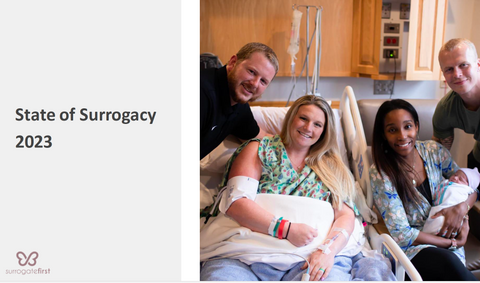SurrogateFirst State of Surrogacy 2023 survey results are now available! The survey goal is to help bring to light the challenges and trends in surrogacy to help all parties involved to have a safer, smoother and successful journey.

EXECUTIVE SUMMARY
Surrogates are truly special. The#1 and #2 most important factorto choosing to become a surrogate is “The desire to help a couple have a family” and “Calling to help others in need.”Furthermore, they are more educated and have a higher household income than theaverage American woman.
Surrogates are HAPPY!How Happy? 8 out of 10 surrogates stated to be “satisfied” or “very satisfied” with their overall journey; witha large majority, 83% of surrogates, statingthey wouldconsider being a repeat surrogate.
Key to Surrogacy Success? Strong family support.The most important source of support for surrogates duringtheir journey wasfamily, 93% stating family as “important” or “very important”.
Surrogacy benefits andbase compensation both jumped.Surrogacy benefits rose35% from$9,100 in 2019 to$12,300 in 2023. Base compensation rose slower, but new base compensation expectations havealso climbed from$50,000 in 2023 to$61,000 for futurejourneys a 22% increase.
Supermajority of surrogates did not experience postpartum depression and would consider surrogacy again.75% of surrogatesdid not experiencepostpartum depression or emotional challenges. 83% wouldconsider surrogacy again, which ismost likelybecause 80%+ had satisfactory journeys.
Strict stance on termination.Only 3%allow for termination for cosmetic reasons missing limb, minor deformity. 13%adheretono termination at all with 50%allowing termination for major life threatening medical reasons, doctorrecommendation only.
Surrogates remain in high demand.Consistent short surrogate match times, 30%within 3 months and 69% within 6 months; recent spike of 22% in basecompensation expectations for future journeys and high first time transfer success rates reflect theon-going demand of qualified surrogates.
Surrogacy is a multi-year undertaking.It takes an average of 12.6 monthsto go from consideration to being matched with anIP(intended parent). The average time fromconsideration to commitment is7.1 months, and the average timefromcommitmentto being matched is 5.5 months. Thisdoesn’teven take into account the attempts toget pregnant and theactualpregnancy andpost-pregnancyrecovery.
Majority of surrogates choose to work with an agency.54% of surrogate journeysused an agency versus35% whomanageditthemselves and the remaining12%were managed mainly by theIP.
1 in 2 surrogateswilling to work with LQBTQ IPs.49% werewilling to work with a samesex couple. In actuality,only 17% didso; which is likely due to the inability of independent surrogates to find such IPs.
Surrogates not seeking help formental health issues.Large majority of surrogates experienced no emotionalissues, 75% and the frequency ofpostpartum depression is similar to that of the national average of 1 of 7 (14%) at (15%-17%). However, issuesarise at the low ratereceiving treatment, less than half at 46%.It isno wonder that the postpartum journey is the leastsatisfied part of thejourney.
#1 Surrogate Pet Peeve.Getting Back to Pre-Pregnancy Weight 39% of surrogates stated that they struggled with getting backto pre-pregnancy weight.Surrogate post journey support in this area is need and lacking attnetion.
Contact Jeff.Hu@surrogatefirst.com for inquiries.




